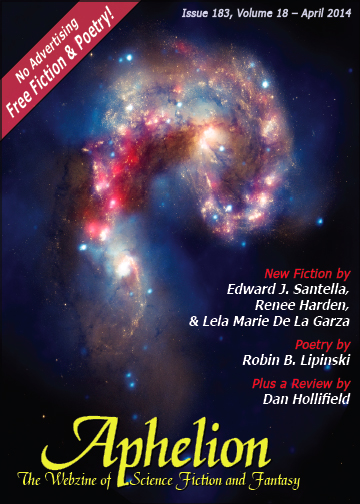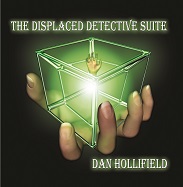http://www.stephanie-osborn.com
Dan Hollifield is an all-around great guy and unbelievably talented. He builds gorgeous handmade props for cosplay; he's an excellent writer; editor in chief of Aphelion webzine; AND he composed an entire album of (licensed) music based on my Displaced Detective series! (DVD here; digital downlink here. I didn't know he was such a fantastic musician!)
He's also a not-so-closet romantic at heart, and I knew he'd have an interesting take on our topic!
~~~
Dan:
How important is the element of romance to a Science Fiction story? I can see that it is almost a requirement in a Fantasy genre story, but is a romantic side plot right for a story that you're writing? Andre Norton managed to weave G-rated romance into quite a few of her novels. Marion Zimmer Bradley added tasteful plot points of both male/female and male/male romance into her Darkover books. So tasteful that if a reader wasn't paying strict attention to the subtext, they'd miss it entirely. There is romance even in Terry Pratchett’s Discworld novels. Now, I'm not talking about the occasional semi-explicit sex scenes that some books contain. My focus here is on romance, a love story element and whether or not it can be used to bring your characters more life within the story. I have used romance as a story element in several of my stories, but I personally prefer to keep any actual sex off-stage, as it were. But this is just what I feel comfortable writing. I primarily write adventure stories, and I've found there are times when the story is in full flow that a couple of the lead characters sometimes do tend to develop a romance as I'm composing the tale. Not something I usually plan to have in the story, but when I reach the point where the characters take over and start telling me what to say, sometimes they're falling in love with one another. So obviously there is a romance circuit in my brain that kicks in when characters start behaving a certain way towards one another. It works for me as a writer, on those occasions.
But, aside from the "I do it" element, my question is, "Is it necessary?" Does it advance the plot? Does it improve or detract from the story? Does it improve the characters? Does a romance within the story read as if it were a natural thing between the characters concerned?
My view is: if it makes the story more fun to read, leave it in. Anything that makes the story less fun to read should be considered for editing out. But that's just me. What works for me might not work for everyone. Now, don't get me wrong. I'm not saying that you can't have bad things happen to your characters. It'd be a pretty boring story that didn't have challenges for the characters to overcome. And there's no need to be sexist, either. In one story I have my Mighty He-Man Hero clubbed in the head and his girlfriend having to save him from the Big Bad-Guy. And that wasn't even a re-edit. The scene just played out in my head that way. My hero wound up taking a blackjack to the head and his girlfriend leaped in to save the day. That scene worked a whole lot better that way than it would have if I'd made my hero ten feet tall and bulletproof, and his girlfriend a helpless paper-doll cutout.
 But my original question remains, how important to a story is a romantic plot element?
But my original question remains, how important to a story is a romantic plot element?I would guess that if said romance advances the story, fleshes out those characters, improves the reader's experience, and "feels" real for those characters, then it is a good addition to a story. If it comes off as a forced thing added in just to have an additional plot point, then a rewrite may be in order. In short, everything hinges on the story itself, the characters, and how those characters have developed as the story progressed. Obviously, the shorter a story is, the more difficult it happens to be to put a lot of character development into it. Flash Fiction, 1000 words as a limit? Really hard to write all on its own. You've got to work to weave in a romantic sub-plot inside a Flash story. 25,000 words? Now you're getting into a story length where a writer can have more room for characters to grow. A writer can play a bit, can develop the characters reasonably well.100,000 words? Your characters better grow a lot, or you run the risk of losing your readers.
But is romance a good way to make your characters more interesting to a reader? I hate to say that it depends on the reader, but I think I'll have to express it that way. But after having said that, I can add that then you wind up with a chance to tell a story that can be read on many different levels at once. Think about your target reader. Adult? Young Adult? Pre-Teen? Each group one aims a story at will come with its own list of requirements. A good writer can work within such restrictions, while at the same time they are by-passing them. Just what am I saying by that? Well, remember that your readers are going to bring their own individual levels of worldly experience into the story as they read. A Pre-Teen is going to have a different idea of what “romance” is than would a Young Adult or an Adult. These differing levels of experience will alter the reader's perception of the same story. A Pre-Teen reader might think, “Oh, first they were arguing, then they made up and became friends, then they went into a room together and closed the door,” after reading one of your romantic scenes. A Young Adult reader might read the same scene and think, “Oh, that's just like in the movies! They're falling in love...” While an Adult reader could read the same scene and think “I know what's going on behind that closed door! Someone's getting busy!” Same words, different readers, different levels of experience with how the world works. But how does a writer do that? How can we layer different visions of the same scene for different readers, using only one set of words?
Remember that every writer has a toolbox. Using the correct tool for a particular job is the key. It all comes down to what words a writer chooses to use to tell a particular story. Your target reader sets the limits. But you can transcend those limits by careful choice of the words you use. Andre Norton did it in almost every single novel. Keith Laumer did too. You don't have to be all overt about anything. You can be subtle. The right word choices can allow a very young reader to understand a scene one way, and an older reader to understand the same scene a different way.
But how does a writer learn how to do that? One thing I am always harping on about in my essays on writing is that a writer has to fill that toolbox. We have to develop a huge vocabulary. We have to understand the way different people see the world. We have to read everything we can lay our hands on. And we have to watch how real people interact in real life. These are things we can learn to do without having to think about it too much. An inexperienced writer does have to work at it. A good writer has spent years filling that toolbox. But the way to learn how to use those tools is to write, and write, and write some more.
And then you edit, proofread, rewrite, and edit some more. That is a never-ending process. Call it “polishing” if you will. The more you polish a story, the shinier it becomes, until you reach a point where [you think] it can't possibly get any brighter. Then you let someone else read it and you *listen* to what they say afterward! You're always going to be too close to the story to see every single flaw. Everyone needs an editor to help them turn out their best work. Adding romance into a story is one way to make your characters more real to your readers. The more real your characters seem to your reader, the more they're going to enjoy your stories. Read, watch, learn, and gain experience for yourself. Writers never stop learning, they never stop reading, they never stop trying to understand *why* people act the way that they do. And everything we see, hear, read, or experience can wind up inside a story.
I'd really like to see a long discussion on this topic. What are *your* views? I'd really like to know.
~~~
So would I, Dan! Because frankly, I agree with you -- it can be essential to character development if handled well. But if handled badly, if it doesn't advance the story or the reader's understanding of the characters involved, it would be better done without.
Readers, let's have at it! What do you think?
-Stephanie Osborn
http://www.stephanie-osborn.com





2 comments:
My take on romance and even sex scenes is as follows: It happens in real life. If, as a writer, one of your goals is to create realism -- realistic characters, and real events -- in your stories, then it is not a matter of IF, but WHERE. Because love and romance and sex occur in real life. Therefore they must occur in realistic stories.
Note that I said WHERE. Just as we real-life people don't generally drop everything in an emergency situation to run off and "do it," so too does it have its appropriate place in a story.
Post a Comment